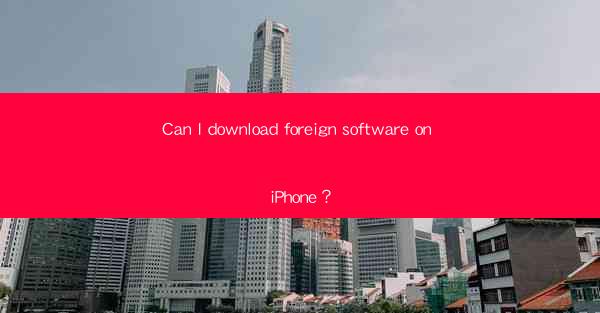
The article delves into the question of whether iPhone users can download foreign software on their devices. It explores various aspects such as the App Store's regional restrictions, the use of alternative app stores, the legality of downloading foreign apps, and the potential risks involved. The article also provides solutions and tips for iPhone users who wish to access foreign software, ensuring a comprehensive understanding of the topic.
Can I Download Foreign Software on iPhone?
The question of whether iPhone users can download foreign software on their devices is a common concern for many. With the vast array of apps available on the App Store, it's natural to wonder if users can access software from other countries. Let's explore this topic from multiple angles.
App Store Regional Restrictions
One of the primary reasons why users might want to download foreign software on their iPhone is due to regional restrictions imposed by the App Store. Apple has a policy of only allowing apps to be downloaded in specific regions based on their availability. This means that some apps might not be available in certain countries due to licensing or content restrictions. For instance, apps related to gambling or adult content might not be available in all regions.
However, this doesn't mean that iPhone users are completely out of luck. There are ways to bypass these restrictions, such as using a VPN or changing the region on your iPhone. By doing so, you can access the App Store in a different country and download apps that are not available in your original region.
Use of Alternative App Stores
Another option for iPhone users who want to download foreign software is to use alternative app stores. There are several third-party app stores available, such as TweakBox, Cydia, and AppValley, which offer a wide range of apps, including those that are not available on the official App Store. These alternative app stores often have a vast collection of foreign software that users can download and install on their iPhones.
While using these alternative app stores can be convenient, it's important to exercise caution. These stores are not regulated by Apple, which means that the apps available may not undergo the same level of scrutiny as those on the official App Store. This can lead to potential security risks, such as malware or viruses.
Legality of Downloading Foreign Apps
The legality of downloading foreign apps on an iPhone is a complex issue. While it is generally legal to download and use foreign software, there are certain exceptions. For instance, if the app violates local laws or regulations, downloading it may be illegal. Additionally, some apps may require a subscription or payment, which might not be allowed in certain regions.
It's important for iPhone users to research the legality of downloading foreign apps before proceeding. This can help avoid legal issues and ensure that they are using the software in a compliant manner.
Security Risks
One of the main concerns when downloading foreign software on an iPhone is the potential security risks. Apps from foreign developers may not have the same level of security as those from reputable sources. This can leave your iPhone vulnerable to malware, viruses, and other cyber threats.
To mitigate these risks, it's crucial to only download apps from trusted sources. This includes using the official App Store, which has strict guidelines for app developers, and being cautious when using alternative app stores. Always read reviews and check the app's rating before installing it on your iPhone.
Updating and Maintaining Foreign Apps
Another challenge of downloading foreign software on an iPhone is keeping the apps updated. Since these apps are not available on the official App Store, they may not receive regular updates. This can lead to compatibility issues with the latest iOS versions and may result in the app becoming outdated or non-functional.
To ensure that your foreign apps remain functional, it's important to keep them updated. This may involve manually checking for updates or using third-party tools to automate the process. However, be cautious when downloading updates from alternative sources, as they may also pose security risks.
Conclusion
In conclusion, iPhone users can indeed download foreign software on their devices, but it's important to approach this with caution. While the App Store's regional restrictions can limit access to certain apps, alternative app stores and VPNs can provide solutions. However, users must be aware of the potential security risks and legal implications associated with downloading foreign software. By following best practices and staying informed, iPhone users can safely enjoy a wider range of apps from around the world.











